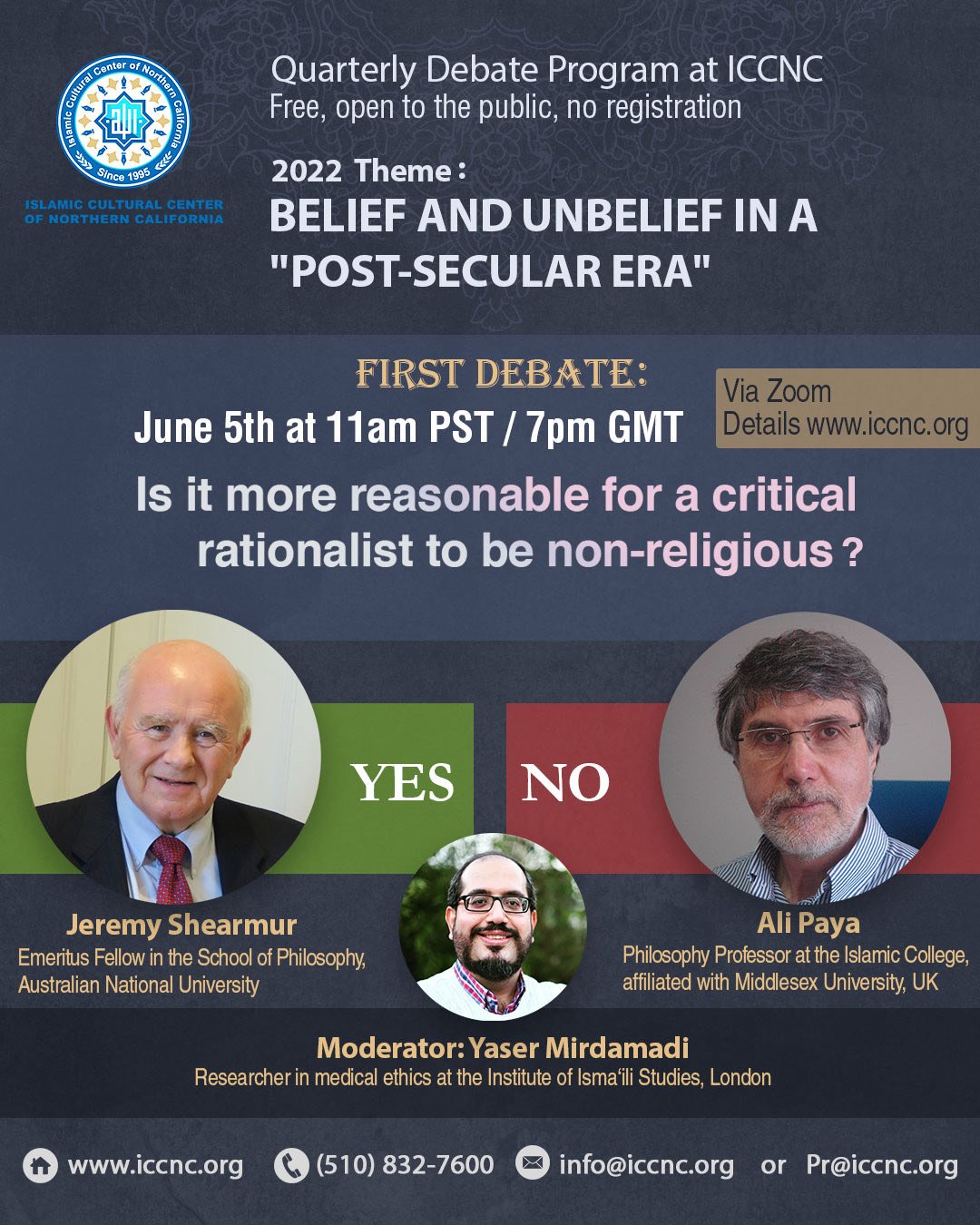First Quarterly Debate on Belief and Unbelief: "Is it more reasonable for a critical rationalist to be a non-religious?"
The Islamic Cultural Center of Northern California (ICCNC) announces the start of a new quarterly debate program to broaden and deepen the general public’s understanding of religion, particularly Islam, in the 21st century. The theme of the first series of the debates is Belief and Unbelief in a “Post-Secular Era.”
Philosophers Dr. Jeremy Sheamur and Dr. Ali Paya will participate in the first debate, entitled, “Is it more reasonable for a critical rationalist to be non-religious?” The event is held on Sunday, June 5, 2022, at 11:00 AM PST/ 7 PM GMT. This debate is moderated by Dr. Yaser Mirdamadi. The debate will be on Zoom and will be live-streamed on ICCNC YouTube Channel.
Biographies
Dr. Jeremy Shearmur was formerly a Reader in Philosophy in the School of Philosophy at the Australian National University, who retired at the end of 2013. Professor Shearmur was educated at the London School of Economics (University of London), where he also worked for eight years as the assistant to Professor Sir Karl Popper. Professor Shearmur's Ph.D. thesis on F. A. Hayek was a joint winner of the British Political Studies Association's Sir Ernest Barker prize in political theory.
He is currently an emeritus fellow, lives in Dumfries, Scotland, and is undertaking research and a limited amount of lecturing and Ph.D. supervision. He was educated at the London School of Economics.
He has taught at the University of Edinburgh, the University of Manchester, and at George Mason University, where he was a research associate professor at the Institute for Humane Studies. He was also Director of Studies at the Centre for Policy Studies in London.
Professor Shearmur has published The Political Thought of Karl Popper (1966) and Hayek and After (1996) and was joint editor of H. B. Acton's The Morals of Markets and Related Essays (1993). Karl Popper, After the Open Society edited with Piers Norris Turner (2008), and The Cambridge Companion to Popper edited with Geoffrey Stokes (2016), A Sceptical Theory of Scientific Inquiry: Problems and Their Progress, editor, 2020. He has also published numerous papers in philosophy and political thought.
Dr. Ali Paya is Professor of Philosophy at the Islamic College (London), Adjunct Professor of Philosophy at the Department of Ethics of Science and Technology, National Research Institute for Science Policy in Iran. Professor Paya has studied at the Sharif University of Technology (BSc. Electronic Engineering), University of Tehran (MA. Philosophy), and the University of London (Chelsea/Kings College, MSc. Philosophy of Sciences and Maths.) and (UCL, Ph.D., Philosophy of Science).
Professor Paya recent publications include “Islam, Modernity and a New Millennium: Themes from a Critical Rationalist Reading of Islam” (Routledge Press, 2019), “Religious Science, Indigenous Science, and Islamic Science: Thinking the Impossible or Thinking Ahead of Time: An Anthology of Ideological Projects of Knowledge Production, Plus Two Critical Assessment of the Views of Two Iranian Thinkers on Science” (Tehran: University Press Centre, 2021), “Science, Society, and Development: Essays on the Public Understanding of Science” (Tehran, National Institute for Science Policy, 2021).
Professor Paya has published numerous papers in Iranian as well as international academic journals.
Dr. Yaser Mirdamadi is a researcher in medical ethics at the Institute of Ismaili Studies, London. In 2019, he received Ph.D. in Islamic and Middle East Studies from the University of Edinborough. He has a MA in Muslim Cultures from Aga Khan University, Institute for the Study of Muslim Civilizations (AKU-ISMC) London, UK, and a MA in Islamic Theology from Ferdowsi University Mashhad, Iran.
Also, Dr. Mirdamadi completed a Level 3 Diploma (equivalent to a Master’s degree) in Classical Islamic studies from Hawza Ilmiyya (Islamic Seminary), Mashhad, Iran.

